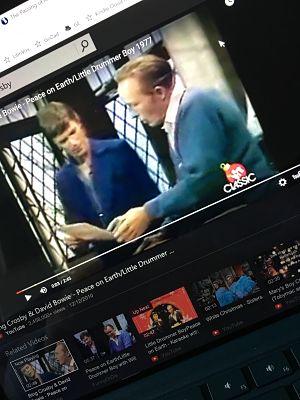Many (all?) of my students will have to be told who David Bowie was. Nothing fades so quickly as celebrity and we don’t know if in thirty years anyone will recall David Bowie. We do know that he once appeared with Bing Crosby on a Christmas special.
Bing was famous on radio, television, movies, and music. He was at the top in all those fields and “Bing” just meant Bing Crosby before it meant a second-tier search engine. My students don’t know him either, though they have heard him from his singing on the number one single of all time: White Christmas. Bing owned Christmas, but he also cared about relevance. Bing and Bob Hope pioneered buddy movie comedy with outlandish gangs that broke the fourth wall all the time. To the year of his death, Bing was looking at “young” comedy groups like Monty Python and planning on updating his own shtick.
He liked genuine singers in pop music and one of them was David Bowie. Even when he was very old, Bing had a natural singing voice that made most pop singers look bad, but not David Bowie. Together they filmed a Christmas duet that marked Bing’s search for continuing relevance and Bowie’s knowledge that time passes.
David Bowie was too cool for Little Drummer Boy, but he was willing to sing a new concoction Peace on Earth. I will make a bet: thirty years from now Bing and Bowie singing their odd Christmas classic will be the most enduring piece of Bowie music.
Why? Christmas is one of the few times the mainstream dips backwards into the history of pop music and Bing owns the best performance of one of the biggest secular Christmas songs. Bing will keep Bowie alive in pop culture. Every year fewer people listen to Bing the pop star and every year from now on Bowie will face the same decline.
Pop stardom fades, but the star of Christmas is forever.
For those of us who like other things Bowie did (Labyrinth!) , and are the generation that thought he was cool, that is more than a bit sad, but that is the way of it. There are no more Bowie and Bing level stars that everyone in a particular decade knows. . . we are too musically fragmented now. But even if we were not, Bowie was a man of his time. There will always be kids who listen to their grandparents music or who go backwards to pop past, but this will not be the mainstream of popular culture.
Popular culture is not popular.
Music that comes from the people is true folk or popular music. Maria von Trapp understood this truth and worried about what it meant. At the very least it means there are very, very few songs that both grandparents (Bowie), children, and their grandchildren still know. Most of our pop music is marketed to us by conglomerates who need new product. Bing and Bowie were sold to us in their eras and the suits will sell us new stars later.
Both Bing and Bowie were smart enough to become “suits” themselves before they died. They got it.
Popular culture is generally not that good.
A lot of Bing and Bowie have not endured, because if you don’t get the era and have a feeling of nostalgia about it, then you don’t have an ear for most of the music. I enjoy Bing enough to have fun watching A Connecticut Yankee in King Arthur’s Court, but it is a product of the times. Don’t try watching The Man Who Fell to Earth unless you are a David Bowie fanatic. Both kept making music right through their last decade, but they were no longer driving pop music. Without a heavy dose of nostalgia, the suits remember the music of their youth, both would have gotten much less attention in their last decades than they received.
What will endure from Bing and Bowie? I suspect not much.
Nostalgia makes things better.
There is nothing wrong with giving Bing a pass if you met your wife to his crooning. Bowie sounds better if a term like Ziggy Stardust doesn’t just make you laugh. Writers of a certain age will say Bowie was the soundtrack of their life, but there will be few people under forty in the number.
And that is fine.
There is nothing wrong with nostalgia unless you forget how ephemeral the object of your devotion is.
Most pop sensations were ignored by most young adults.
If you endure long enough, you might penetrate the minds of most Americans. But recall: most young adults in the 1970’s and the 1980’s were not “super into” Bowie. Many never listened to him at all or strongly disliked him. As time passes, corporate folk help decide the “beloved memories” of a generation. If you were one of the millions who opted out of “rock and roll” in the 1950’s for other forms of music (country for example), then you cease to fit the pop culture image of an entire decade. Millions of young adults did not like the stars that “defined their generation” and have no memory of them.
This was true of Bing. It is true of Bowie.
And yet Bowie made music that was enjoyable, kept pushing boundaries, and learning new tricks. He was a pop star that understood the industry and tried to play by his own rules and often succeeded. For millions of people of a certain age in the English speaking world, he made product that did give pleasure.
For the gift of memories, we are right to pray that the soul of David Bowie rests in peace.
















